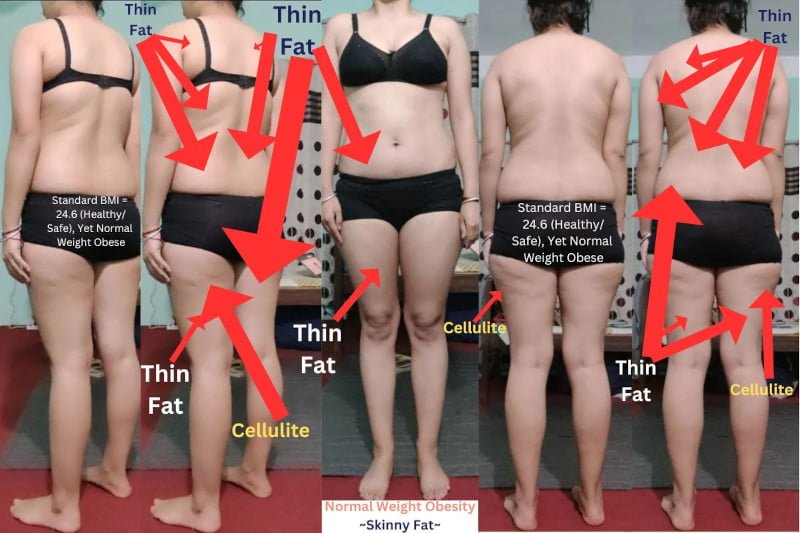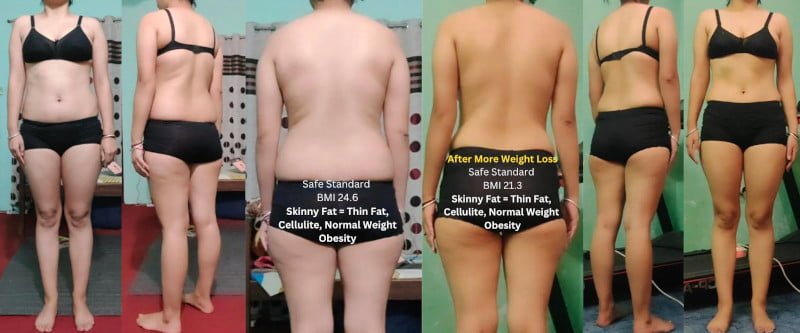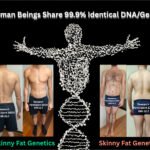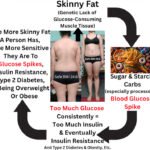How Skinny Fat Affects Mental Health

Now that we have clarified what skinny fat is and how to fix it in terms of diet, exercise, and lifestyle relative to physical health, it is important to understand how skinny fat affects mental health.
Human mental health directly correlates to what we think we are supposed to look like as a human being. Our body height, weight, shape, curves, features, muscle/mass, and definition, at least. What the average person sees — diverse shows, subject matter, and advertisements — on television, in movies, on social media, and in magazines, no less, has profound effects, typically negative, on body image and mental health (1, 2, 3, 4, 5, 6, 7, 8). Thin, toned, muscular, defined, attractive human body shapes with “all the right curves” and features are typically considered “normal”.
This “norm” is reinforced when you go to see the doctor. You, like every human being, are being judged by the Standard Body Type One (BT1) found in any scientifically/medically approved human body anatomy book/resource (9, 10, 11):

According to mainstream science and medicine, once you are within safe Standard BMI (18.5 to 24.99) you are the Standard BT1 with all 600+ muscles developed. The only reason you don’t look like a Standard BT1 is you are eating too many calories above Standard BMR calories. Reduce your calorie intake and lose the excess regular white/yellow fat weight and, viola, you are once again the Standard Body Type One (BT1).
How true is that to reality?
How Skinny Fat Affects Mental Health – Everyone is Not a Standard Body Type One (BT1)
Children and adolescents (teens), in particular, see these “norms” and seek to be “normal.” While shamers, haters, and trolls take pleasure in bullying people who are not “normal”. But the latest Body Type Science research data (12)  shows that every human being is NOT born in the “normal” Standard BT1. The Standard BT1 is inaccurate (13) because it fails to account for no less than skinny fat tissue; thin fat and/or cellulite (14).
shows that every human being is NOT born in the “normal” Standard BT1. The Standard BT1 is inaccurate (13) because it fails to account for no less than skinny fat tissue; thin fat and/or cellulite (14).
This inaccurate “normal” standard encourages impossible, unrealistic body composition and shape (figure/physique) expectations and goals in people, in general — but especially among children and adolescents — to be a Standard BT1. Which increases the risk (6, 1, 2, 3, 4, 5, 7, 8) of body dissatisfaction and other health issues (15, 16, 17, 18, 19, 20, 21, 22, 23) like anxiety, depression, body dysmorphia (body dysmorphic disorder/BDD), and eating disorders (EDs) such as anorexia nervosa, bulimia nervosa, binge eating (binge eating disorder/BED), avoidant restrictive food intake disorder (ARFID), etc., directly affecting physical, emotional, and mental health.
Unique Genetic Body Composition
It is a fact that genetics is the foundational blueprint (24, 25, 26) of the human body. Genetic heritability (27, 28, 29, 30) determines unique genetic structure, body composition, and shape. Environment, including diet, exercise, and lifestyle, influences unique genetic body composition and shape temporarily (31, 32), but at this time you cannot permanently (33, 34, 35) change your unique genetic body composition including muscle mass.
Yet, the widespread misleading and false information on TV, in movies and magazines, and on social media, etc. claims that with enough diet, exercise, and lifestyle hard work, you can permanently change (recomp) your unique genetic body composition and have a body just like your favorite celebrity, influencer, or the like.
Body Recomposition (Body Recomp)

Body recomposition (36) is most certainly not permanent (37) and for many people, thanks to their genetics, it is more difficult if not impossible to achieve as desired. Unique genetic body composition and shape matter. The more skinny fat tissue (thin fat, cellulite) that a person is experiencing, the less likely it is that they can recomposition/change their body composition enough to look like the Standard BT1.
And for those people who do come close to or even possibly fully achieve the Standard BT1 look they want, the vast majority fail to realize that their body recomp achievement is temporary. Once they stop doing all the hard body recomp work that allowed for their achievement — losing regular white/yellow fat weight, adding muscle mass, and reducing skinny fat (if they have any) — they will inevitably, gradually lose the added muscle mass, most likely regain at least some regular fat weight, and eventually return to their original default genetic body composition and shape including muscle/mass (or lack of) as well as skinny fat (if any) — like Research Participant 378 (38).

Gaslighting and Mental Health
As for the people who get within safe BMI yet fail to realize their body recomposition goals due to skinny fat tissue even when they do put in the hard work, they are gaslighted (39), “…manipulating someone into questioning their own perception of reality…deception of one’s memory, perception of reality, or mental stability,” relentlessly by everyone — influencers, medical professionals, politicians, laypeople, family, friends, etc. — all who claim that the person is lying, cheating, and just plain lazy (not working hard enough), and being skinny fat is their fault.
Of course, genetics are just an excuse. Which, at the very least, damages self-confidence and mental health.


All the while, those same dubious people (many who are scientists) cannot offer a single explanation, remedy, or solution once the person is within safe Standard BMI. No matter how close to 18.5 BMI they get, they cannot get rid of the skinny fat tissue (thin fat, cellulite). Yet, somehow magically, it is still their fault.
Which further damages self-confidence and mental health, no less.
Understanding Unique Genetic Body Composition – How Skinny Fat Affects Mental Health
The key to wrangling the global mental health crisis (41, 42, 43) and obesity epidemic (44, 45, 46, 47) lies in scientifically understanding unique genetic body composition (muscle/mass, regular fat, skinny fat) and metabolism in relation to science-based diet (48), exercise (49), and lifestyle (50).
The Scientific Health Quizzes including the Scientific Body Type Quiz (51), Scientific Metabolism Quiz Health Score (52), Scientific Diet Quiz Health Score (53), Scientific Exercise Quiz Health Score (54), and Scientific Lifestyle Quiz Health Score (55) were developed using the latest scientific data, evidence, and facts in proprietary algorithms to accurately calculate your unique metrics to help keep body composition and shape expectations and goals realistic and achievable.
Are Regular Fat and Skinny Fat the Same Thing?
References
- NIH, National Library of Medicine: Online Social Networking and Mental Health, October 1, 2014, Igor Pantic, MD, PhD. https://www.ncbi.nlm.nih.gov/pmc/articles/PMC4183915/
- Yale Medicine: How Social Media Affects Your Teen’s Mental Health: A Parent’s Guide, June 17, 2024, Kathy Katella. https://www.yalemedicine.org/news/social-media-teen-mental-health-a-parents-guide
- UC Davis Health: Social media’s impact on our mental health and tips to use it safely, May 10, 2024, Medically reviewed by Dawn Bounds, Ph.D. https://health.ucdavis.edu/blog/cultivating-health/social-medias-impact-our-mental-health-and-tips-to-use-it-safely/2024/05
- NIH, National Library of Medicine: The impact of the media on eating disorders in children and adolescents, May-June 2003, Anne M Morris, MBBS MPH FRACP1 and Debra K Katzman, MD FRCPC. https://www.ncbi.nlm.nih.gov/pmc/articles/PMC2792687/
- Mayo Clinic, Tween and teen health: Teens and social media use: What’s the impact?, January 18, 2024, Mayo Clinic Staff. https://www.mayoclinic.org/healthy-lifestyle/tween-and-teen-health/in-depth/teens-and-social-media-use/art-20474437
- NIH, National Library of Medicine: Influence of the Mass Media and Body Dissatisfaction on the Risk in Adolescents of Developing Eating Disorders, May 16, 2019, Francisco Nataniel Macedo Uchôa, Natalia Macêdo Uchôa, Thiago Medeiros da Costa Daniele, Romário Pinheiro Lustosa, Nuno Domingos Garrido, Naira Figueiredo Deana, Ágata Cristina Marques Aranha, and Nilton Alves. https://www.ncbi.nlm.nih.gov/pmc/articles/PMC6540021/
- National Eating Disorders Association; Media and Eating Disorders, Reviewed by Amy Baker Dennis, PhD, FAED. https://www.nationaleatingdisorders.org/media-and-eating-disorders/
- University of Colorado at Boulder Anschutz Medical Campus: Mounting Research Documents the Harmful Effects of Social Media Use on Mental Health, Including Body Image and Development of Eating Disorders, May 3, 2024, Emily Hemendinger, LCSW. https://news.cuanschutz.edu/news-stories/mounting-research-documents-the-harmful-effects-of-social-media-use-on-mental-health-including-body-image-and-development-of-eating-disorders
- Britannica: human muscle system, Last updated July 29, 2024, Robin Huw Crompton, Christopher Tangen, Shane W. Cummings, Bernard Wood Adam Augustyn, Robert Curley, Gloria Lotha, Richard Pallardy, Chelsey Parrott-Sheffer, Kara Rogers, Amy Tikkanen, and Grace Young (Reviewed by The Editors of Encyclopaedia Britannica).
https://www.britannica.com/science/human-muscle-system - Cleveland Clinic: Muscles, https://my.clevelandclinic.org/health/body/21887-muscle
- Healthline: Muscular, January 21, 2018, The Healthline Editorial Team (Medically review by the Healthline Medical Network). https://www.healthline.com/human-body-maps/muscular-system#1
- Fellow One Research: Body Type Science Research Data. https://www.fellowone.com/category/fellow-one-research/the-four-body-types/body-type-science/body-type-quiz/research-data/
- KevinMD: Why body type standards are wrong in measuring health, November 4, 2022, Marc Nelson. https://www.kevinmd.com/2022/11/why-body-type-standards-are-wrong-in-measuring-health.html
- Skinny Fat Science: What Is Skinny Fat? July 26, 2024. https://skinnyfat.fellowone.com/what-is-skinny-fat/
- WebMD: What Is Body Dysmorphia?, October 16, 2024, Allison Torres Burtka (Medically Reviewed by Zilpah Sheikh, MD). https://www.webmd.com/mental-health/mental-health-body-dysmorphic-disorder
- Discovery, Mood & Anxiety Program: Understanding the Difference Between Body Dysmorphia, Self-Esteem, and Negative Body Image, Admin. https://discoverymood.com/blog/understanding-difference-body-dysmorphia-self-esteem-negative-body-image/
- Mayo Clinic: Body dysmorphic disorder, December 12, 2022, Mayo Clinic Staff. https://www.mayoclinic.org/diseases-conditions/body-dysmorphic-disorder/symptoms-causes/syc-20353938
- NIH, National Library of Medicine: Is There Any Relationship Between Body Image Perception, Eating Disorders, and Muscle Dysmorphic Disorders in Male Bodybuilders?, July 13, 2018, Aslı Devrim, Pelin Bilgic, and Nobuko Hongu. https://pmc.ncbi.nlm.nih.gov/articles/PMC6142149/
- NIH, National Library of Medicine: DSM-IV to DSM-5 Body Dysmorphic Disorder Comparison, https://www.ncbi.nlm.nih.gov/books/NBK519712/table/ch3.t19/
- Healthline: 6 Common Types of Eating Disorders (and Their Symptoms), June 11, 2024, Alina Petre, MS, RD (NL) (Medically reviewed by Katherine Marengo LDN, R.D., Nutrition). https://www.healthline.com/nutrition/common-eating-disorders
- NIH, National Institute of Mental Health: Eating Disorders: What You Need to Know, Revised 2024, U.S. DEPARTMENT OF HEALTH AND HUMAN SERVICES National Institutes of Health NIH Publication No. 24-MH-4901. https://www.nimh.nih.gov/health/publications/eating-disorders
- Mayo Clinic, Eating disorders, March 28, 2023, Mayo Clinic Staff. https://www.mayoclinic.org/diseases-conditions/eating-disorders/symptoms-causes/syc-20353603
- Cleveland Clinic: Eating Disorders, September 23, 2024. https://my.clevelandclinic.org/health/diseases/4152-eating-disorders
- NIH, National Library of Medicine: Mapping and Sequencing the Human Genome – 2 Introduction. https://www.ncbi.nlm.nih.gov/books/NBK218247/
- Cleveland Clinic: DNA, Genes & Chromosomes, https://my.clevelandclinic.org/health/body/23064-dna-genes–chromosomes
- Vanderbilt University, Basic Sciences: DNA is the ultimate blueprint— but epigenetics changes how it’s read, March 7, 2024, Marissa Shapiro. https://medschool.vanderbilt.edu/basic-sciences/2024/03/07/dna-is-the-ultimate-blueprint-but-epigenetics-changes-how-its-read/
- ScienceDirect, Nutrition: Genetic aspects of body composition, Volume 15, Issues 7–8, July–August 1999, Pages 609-613, John B Owen BSC, PHD, MA. https://www.sciencedirect.com/science/article/abs/pii/S0899900799000970
- NIH, National Library of Medicine: The heritability of body composition, May 8, 2021, Avivit Brener, Yarden Waksman, Talya Rosenfeld, Sigal Levy, Itai Peleg, Adi Raviv, Hagar Interator, and Yael Lebenthal. https://www.ncbi.nlm.nih.gov/pmc/articles/PMC8105919/
- Britannica: human genetics, Hampton L. Carson, Arthur Robinson, Thinley Kalsang Bhutia, Gloria Lotha, Kara Rogers, Marco Sampaolo (Fact-check by The Editors of Encyclopaedia Britannica). https://www.britannica.com/science/human-genetics
- NIH, National Library of Medicine: CHAPTER 1 – GENETICS 101. https://www.ncbi.nlm.nih.gov/books/NBK115568/
- NIH, National Library of Medicine: Factors That Influence Body Weight, https://www.ncbi.nlm.nih.gov/books/NBK221834/
- Healthline: How to Improve Body Composition, Based on Science, October 1, 2017, Grant Tinsley, Ph.D., CSCS,*D, CISSN. https://www.healthline.com/nutrition/improve-body-composition
- Healthline: Exercise Break: How Long Does It Take to Lose Muscle Mass?, November 1, 2018, Lindsay Ross-Hazel. https://www.healthline.com/health/how-long-does-it-take-to-lose-muscle-mass
- GQ: It Actually Takes a Lot Longer Than You’d Think to Lose Muscle From Not Working Out, January 26, 2024, Hannah Singleton. https://www.gq.com/story/how-long-does-it-take-to-lose-muscle-gains
- Shape: How Long Does It Take to Lose Muscle?, July 28, 2022, Megan Falk. https://www.shape.com/fitness/workouts/strength-training/how-long-does-it-take-to-lose-muscle
- Cleveland Clinic: What To Know About Body Recomposition, April 16, 2024, https://health.clevelandclinic.org/body-recomposition
- Skinny Fat Science: How To Fix Skinny Fat, July 27, 2024. https://skinnyfat.fellowone.com/how-to-fix-skinny-fat/
- Fellow One Research: Research Participant 378 – Body Type Two (BT2) Male (Man), Millennial (Generation Y). https://www.fellowone.com/fellow-one-research/the-four-body-types/body-type-quiz/research-participant-378-body-type-two-bt2-male-man-millennial-generation-y/
- Wikipedia: Gaslighting, https://en.wikipedia.org/wiki/Gaslighting
- Fellow One Research: Body Type Test (Quiz) Results 1170 – Body Type Three (BT3) Female (Woman), Generation Z. https://www.fellowone.com/fellow-one-research/the-four-body-types/body-type-quiz/body-type-test-quiz-results-1170-body-type-three-bt3-female-woman-generation-z/
- Project HOPE: The Global Mental Health Crisis: 10 Numbers to Note, May 20, 2024, Emma Schwartz. https://www.projecthope.org/news-stories/story/the-global-mental-health-crisis-10-numbers-to-note/
- World Health Organization (WHO): WHO highlights urgent need to transform mental health and mental health care, June 17, 2022. https://www.who.int/news/item/17-06-2022-who-highlights-urgent-need-to-transform-mental-health-and-mental-health-care
- NIH, National Library of Medicine: Global Mental Health: Where We Are and Where We Are Going, May 31, 2023, Modhurima Moitra, Shanise Owens, Maji Hailemariam, Katherine S. Wilson, Augustina Mensa-Kwao, Gloria Gonese, Christine K. Kamamia, Belinda White, Dorraine M. Young, and Pamela Y. Collins. https://www.ncbi.nlm.nih.gov/pmc/articles/PMC10230139/
- Center for Disease Control (CDC): The Obesity Epidemic (7:13), July 22, 2011. https://www.cdc.gov/digital-social-media-tools/cdctv/obesity-epidemic/obesity-epidemic.html
- Wikipedia: Epidemiology of obesity, https://en.wikipedia.org/wiki/Epidemiology_of_obesity
- World Health Organization (WHO): Controlling the global obesity epidemic. https://www.who.int/activities/controlling-the-global-obesity-epidemic
- NIH, National Library of Medicine: A 2022 update on the epidemiology of obesity and a call to action: as its twin COVID-19 pandemic appears to be receding, the obesity and dysmetabolism pandemic continues to rage on, May 15, 2022, Chrysoula Boutari and Christos S. Mantzoros. https://www.ncbi.nlm.nih.gov/pmc/articles/PMC9107388/
- Skinny Fat Science: The Best Skinny Fat Diet, According to Science, July 29, 2024. https://skinnyfat.fellowone.com/the-best-skinny-fat-diet-according-to-science/
- Skinny Fat Science: The Best Skinny Fat Exercise, According to Science, August 2, 2024. https://skinnyfat.fellowone.com/the-best-skinny-fat-exercise-according-to-science/
- Skinny Fat Science: The Best Skinny Fat Lifestyle, According to Science, August 14, 2024. https://skinnyfat.fellowone.com/the-best-skinny-fat-lifestyle-according-to-science/
- Fellow One Research, Scientific Health Quizzes: Scientific Body Type Quiz (Official). https://scientificbodytypequiz.fellowone.com/product/scientific-body-type-quiz-official/
- Fellow One Research, Scientific Health Quizzes: Scientific Metabolism Quiz Health Score. https://scientificbodytypequiz.fellowone.com/product/scientific-metabolism-quiz-health-score/
- Fellow One Research, Scientific Health Quizzes: Scientific Diet Quiz Health Score. https://scientificbodytypequiz.fellowone.com/product/scientific-diet-quiz-health-score/
- Fellow One Research, Scientific Health Quizzes: Scientific Exercise Quiz Health Score. https://scientificbodytypequiz.fellowone.com/product/scientific-exercise-quiz-health-score/
- Fellow One Research, Scientific Health Quizzes: Scientific Lifestyle Quiz Health Score. https://scientificbodytypequiz.fellowone.com/product/scientific-lifestyle-quiz-health-score/












